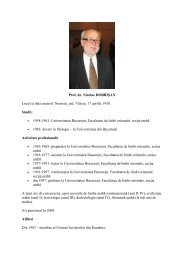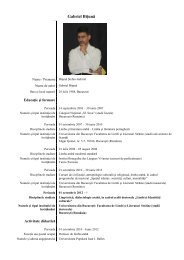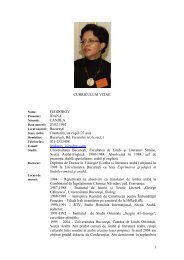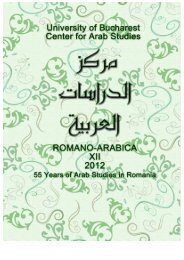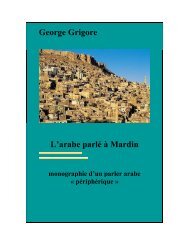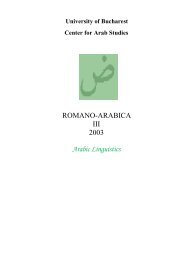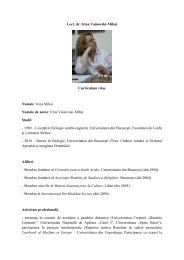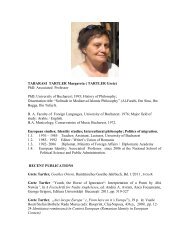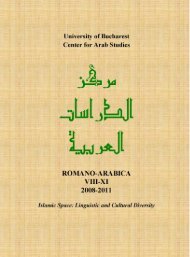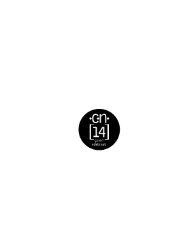University of Bucharest
University of Bucharest
University of Bucharest
Create successful ePaper yourself
Turn your PDF publications into a flip-book with our unique Google optimized e-Paper software.
adrūn h}ōyit} kisīr hamrayām kānat<br />
―There was a lot <strong>of</strong> gold (golden coins) in the house‖ (QAD).<br />
ziklonāt hamrayām-tangayām h~azuwa, ġaduwa<br />
―They took gold and silver [and] went away‖ (QAD).<br />
kokōyata kulla hamrāt h~azuwa, kisatumāt-kisayām hašuwa<br />
―The brothers took the whole gold [that was there]; filled the purses‖<br />
(QAD).<br />
The forms h~azuwa, ġaduwa and hašuwa (Comp. with Arabic h}aša (u))<br />
represent plural forms <strong>of</strong> the 3rd person (h~azaw, ġadaw, hašaw). With the addition<br />
<strong>of</strong> the pronominal suffix we get h~azuwa, ġaduwa, hašuwa.<br />
i‗čoyh~ōna kisīr mōšīnām ademiyāt kānaw.<br />
―In the tea-house there was a lot <strong>of</strong> people, who came for entertainment<br />
(walkers)‖.<br />
mōšīnām contains the following elements mōš-īn-ām. From the two forms<br />
<strong>of</strong> presented plural one is used with mīm.<br />
nah}nāt madīna naġade, pōšō binta inšūfa, salāsatnam naġade,<br />
fahadna hama bint noh~usa.<br />
―We shall go to the town; we shall see the daughter <strong>of</strong> the Pasha; the three<br />
<strong>of</strong> us‘ll come [and] one <strong>of</strong> us‘ll marry this beauty (daughter) (we shall take this<br />
girl for one <strong>of</strong> us)‖.<br />
In the word salāsatnam m is added to the pronominal suffix <strong>of</strong> the plural<br />
form <strong>of</strong> the 1st person. From one side, this might express dual plural form or,<br />
from the other, 2nd and 3rd person plural pronominal suffixes, developed in<br />
analogy with the forms <strong>of</strong> the construction. In both cases the expression <strong>of</strong> plural<br />
should be taken into consideration with mīm, the reflection <strong>of</strong> which in the<br />
Classical Arabic is the construction <strong>of</strong> plural for 2nd and 3rd persons with m:<br />
comp. -kum//-hum: baytukum ―your house‖, baytuhum ―their house‖.<br />
zōka i‗ibsōt i‗wača ‘abu ‘umma isimumāt nasağa<br />
―He made an embroidery <strong>of</strong> the names <strong>of</strong> his mother and father [parents]<br />
on the carpet‖.<br />
32



